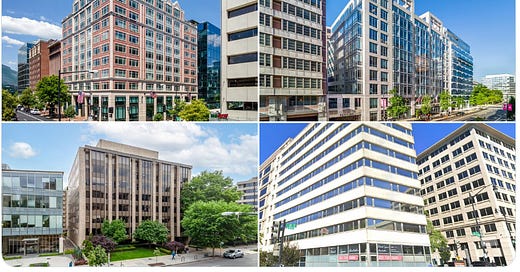Prime DC Office Space: Was Hot Property, Now on the Auction Block - Why?
Welcome to Wall street Socialism. Where Profits are Privatized and Losses are Socialized. Buckle in and Buy Silver.
The commercial real estate market in Washington DC is experiencing significant distress, particularly in the office sector. Here's a breakdown of the situation:
Trophy Office Buildings in DC Facing Auctions
Several prime office properties in Washington DC's most prestigious areas are being put up for auction:
1750 H St. NW (three blocks from the White House)
1776 Massachusetts Ave NW (near Dupont Circle)
601 Indiana Ave NW (near Judiciary Square)
2001 Pennsylvania Ave NW (a block from the World Bank)
Additionally, a foreclosure affidavit has been recorded for 1129 20th St NW (Liberty Building).
Commercial Real Estate Loan Maturity Crisis
The situation in Washington DC is part of a broader issue facing the commercial real estate market:
An estimated $540 billion in commercial real estate loans are set to mature in 2024, with another $535 billion maturing in 2025.
By 2027, approximately $2.2 trillion in commercial real estate debt will need to be rolled over.
These loans are maturing at a time when interest rates are significantly higher than when they were originated.
Impact of Higher Interest Rates
The 10-year Treasury yield, often used as a benchmark for commercial real estate loans, has increased by about 350 basis points since mid-2020.
Loans originating during the early phases of the pandemic, when interest rates were very low, are at increased risk of delinquency or default when renewing in the current higher-rate environment.
Factors Contributing to DC's Office Market Distress
Remote work trends reducing office space demand
Higher interest rates making refinancing more challenging
Declining property values, especially in the office sector
Lenders becoming more cautious about commercial real estate loans
Broader Implications
The situation in Washington DC is indicative of challenges facing commercial real estate markets nationwide, particularly in the office sector. As more loans come due in a higher interest rate environment, we may see similar distress in other major cities across the United States.




